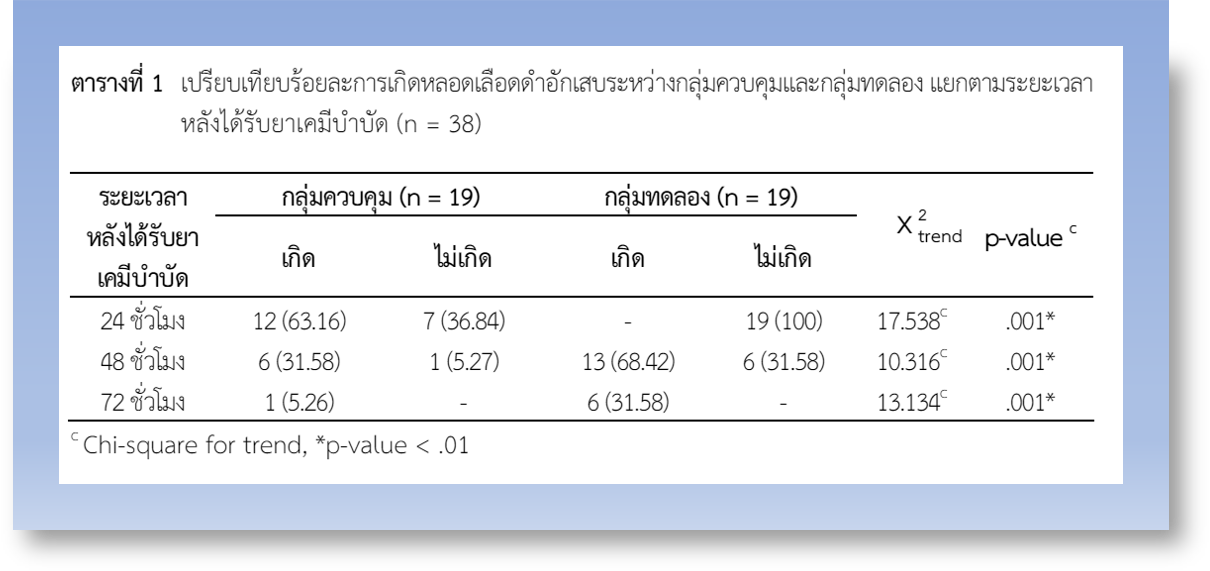ผลของโปรแกรมการพยาบาลแบบสนับสนุนและให้ความรู้ต่อการเกิดหลอดเลือดดำอักเสบในผู้ป่วยมะเร็งที่ได้รับยาเคมีบำบัด
คำสำคัญ:
โปรแกรมการพยาบาลแบบสนับสนุนและให้ความรู้, หลอดเลือดดำอักเสบ, ผู้ป่วยมะเร็งที่ได้รับยาเคมีบำบัดบทคัดย่อ
การวิจัยกึ่งทดลองแบบสองกลุ่มวัดผล เพื่อศึกษาผลของโปรแกรมการพยาบาลแบบสนับสนุนและให้ความรู้ต่อการเกิดหลอดเลือดอักเสบในผู้ป่วยมะเร็งที่ได้รับยาเคมีบำบัด จำนวน 38 ราย ณ โรงพยาบาลมหาวิทยาลัยแห่งหนึ่ง แบ่งเป็นกลุ่มควบคุมได้รับการพยาบาลตามปกติและกลุ่มทดลองได้รับโปรแกรมการพยาบาลแบบสนับสนุนและให้ความรู้ร่วมกับการพยาบาลตามปกติ กลุ่มละ 19 ราย เครื่องมือวิจัย คือ 1) โปรแกรมการพยาบาลแบบสนับสนุนและให้ความรู้ตามกรอบแนวคิดโอเร็ม 2) มาตรวัดความรุนแรงของหลอดเลือดดำอักเสบจากยาเคมีบำบัด และ 3) แบบบันทึกการเกิดหลอดเลือดดำอักเสบจากยาเคมีบำบัดมีดัชนีความเชื่อมั่นระหว่างผู้ประเมิน เท่ากับ .88 วิเคราะห์ข้อมูลโดยสถิติเชิงพรรณนา สถิติทดสอบไคสแควร์ และฟิชเชอร์เอ็กแซค
ผลการวิจัย พบว่า ในระยะ 24, 48 และ 72 ชั่วโมงหลังได้รับยาเคมีบำบัดกลุ่มทดลองเกิดหลอดเลือดดำอักเสบน้อยกว่ากลุ่มควบคุม โดยกลุ่มทดลองมีระดับความรุนแรงต่ำกว่ากลุ่มควบคุมอย่างมีนัยสำคัญทางสถิติ (p-value < .01 และ p-value < .05 ตามลำดับ) โปรแกรมการพยาบาลแบบสนับสนุนและให้ความรู้ สามารถส่งเสริมให้ผู้ป่วยมะเร็งที่ได้รับยาเคมีบำบัดดูแลตนเองเพื่อป้องกันการเกิดหลอดเลือดดำอักเสบ รวมถึงลดความรุนแรงของหลอดเลือดดำอักเสบได้ ดังนั้น โปรแกรมฯ นี้สามารถนำไปใช้ดูแลผู้ป่วยมะเร็งที่ได้รับยาเคมีบำบัดร่วมกับการพยาบาลตามปกติได้
เอกสารอ้างอิง
Nekuzad N, Torab TA, Mojab F, Alavi-Majd H, Azadeh P, Ehtejab G. Effect of external use of sesame oil in the prevention of chemotherapy-induced phlebitis. Iranian Journal of Pharmaceutical Research 2012;11(4):1065-71.
Gao Y, Jiang T, Mei S, Zhang S, Zhu C, Sun Y. Meta-analysis of aloe vera for the prevention and treatment of chemotherapy-induced phlebitis. International Journal of Clinical and Experimental Medicine 2016;9(6):9642-50.
Rahmani R. Effect of topical TNG to prevent from phlebitis through using venous catheter on patients who were under chemotherapy treatment [Dissertation]. Iran: Bagiyatallah University of Medical Sciences; 2008.
Kaewfu J. Effect of cold pack applications on chemotherapy-induced injuries of blood vessels. Journal of Health Science of Thailand 2019;28 Suppl 2:S139-46. (in Thai)
Kaewwilai S, Uadrang S. Incidence of superficial vein thrombophlebitis in cancer patient after chemotherapy. Journal of the Department of Medical Services 2022;47(3):27-31. (in Thai)
Macklin D. Phlebitis: a painful complication of peripheral IV catheterization that may be prevented. American Journal of Nursing 2003;103(2):55-60.
Tzolos E, Salawu A. Improving the frequency of visual infusion phlebitis (VIP) scoring on an oncology ward. BMJ Quality Improvement Reports 2014;3(1):u205455.w2364. doi: 10.1136/bmjquality.u205455.w2364.
Niedzwiedz CL, Knifton L, Robb KA, Katikireddi SV, Smith DJ. Depression and anxiety among people living with and beyond cancer: a growing clinical and research priority. BMC Cancer 2019;19:943. doi: 10.1186/s12885-019-6181-4.
Chengtawee P, Sirilerttrakul S. Factors related to depressive episode among the colorectal cancer patients receiving chemotherapy: a case study at oncology unit, Ramathibodi hospital. Srinagarind Medical Journal 2017;32(1):63-70. (in Thai)
Magallón-Pedrera I, Pérez-Altozano J, Echaburu VJA, Beato-Zambrano C, Borrega-García P, de la Torre-Montero DC. ECO-SEOM-SEEO safety recommendations guideline for cancer patients receiving intravenous therapy. Clinical and Translational Oncology 2020;22(11):2049-60. doi: 10.1007/s12094-020-02347-1.
Gorski LA, Hadaway L, Hagle ME, Broadhurst D, Clare S, Kleidon T, et al. Infusion therapy standards of practice. Journal of Infusion Nursing 2021;44(1S Suppl 1):S1-224. doi: 10.1097/NAN.0000000000000396.
Vein & Vascular Institute. How to keep your veins healthy [Internet]. 2023 [cited 2022 Sep 9]. Available from: https://www.veinvascular.com/vein/how-to-keep-your-veins-healthy/
Registration and Medical Statistics Section, Office of the Director of Vajira Hospital. Performance report in fiscal year 2019, Faculty of Medicine Vajira hospital, Navamindradhiraj university. Bangkok: Office of the Director of Vajira Hospital; 2019. (in Thai)
Boonlee A, Sumdaengrit B, Junda T. Serpentine supravenous hyperpigmentation experience and body image in patients with cancer receiving chemotherapy. Nursing Research and Innovation Journal 2022;28(3):336-52. (in Thai)
Sawaengdee K, Ruangrattanatrai W, Hanvoravongchai P, Gajeena A. Analyses of workload and productivity of 12 public hospital nurses in region 2 of Thailand. Journal of Health Science of Thailand 2015;24(4):741-50. (in Thai)
Behnamfar N, Yekta PZ, Mojab F, Naeini SMK. The effect of nigella sativa oil on the prevention of phlebitis induced by chemotherapy: a clinical trial. Biomedicine 2019;9(3):32-8. doi: 10.1051/bmdcn/2019090320.
Ali BH, Blunden G. Pharmacological and toxicological properties of Nigella sativa. Phytotherapy Research 2003;17(4):299-305. doi: 10.1002/ptr.1309.
Orem DE. Nursing concepts of practice. 6th ed. St. Louis: Mosby; 2001.
Pongprathet J, Sittisombut S, Soivong P. The effect of supportive-educative nursing system on fatigue among acute leukemia persons receiving chemotherapy. Nursing Journal CMU 2021;48(1):15-27. (in Thai)
Wongsawassot A, Temthup S, Ponmad S. Effects of the educative supportive nursing program on dietary self care and serum albumin of patients with hepatocellular carcinoma. Thai Journal of Nursing and Midwifery Practice 2021;8(2):72-86. (in Thai)
Khatiban M, Shirani F, Oshvandi K, Soltanian A, Ebrahimiyan R. Effect of supportive-educative nursing system on self-care skills in trauma patients with chest drainage system. Journal of Hayat 2014;20(1):48-58.
Pfeiffer E. A short portable mental status questionnaire for the assessment of organic brain deficit in elderly patients. Journal of American Geriatrics Society 2010;23:433-41.
Mosayebi N, Shafipour SZ, Asgari F, Atrkarroushan Z, Pasdaran A. The efficacy and safety of sesame oil in prevention of chemotherapy-induced phlebitis in children with acute lymphoblastic leukemia. Iranian Journal of Pediatric Hematology and Oncology 2017;7(4):198-206.
Harris V, Hughes M, Roberts R, Dolan G, Williams EM. The development and testing of a chemotherapy-induced phlebitis severity (CIPS) scale for patients receiving anthracycline chemotherapy for breast cancer. Journal of Clinical Medicine 2020;9(3):701. doi: 10.3390/jcm9030701.
Thongkao S, Kimsungnoen N, Namjuntra R. Effects of educative-supportive program on self-care behaviors and blood pressure levels among young adult patients with uncontrolled hypertension. Thai Journal of Cardio-Thoracic Nursing 2021;32(2):73-88. (in Thai)
Chaiyakod M, Kunsongkiet W, Masingboon K. Effects of the supportive-educative nursing program on self-care knowledge, self-care behavior and clinical outcomes of hypertensive patients at risk of renal complications. Thai Pharmaceutical and Health Science Journal 2017;12(4):193-201. (in Thai)

ดาวน์โหลด
เผยแพร่แล้ว
รูปแบบการอ้างอิง
ฉบับ
ประเภทบทความ
สัญญาอนุญาต
ลิขสิทธิ์ (c) 2024 วารสารเกื้อการุณย์

อนุญาตภายใต้เงื่อนไข Creative Commons Attribution-NonCommercial-NoDerivatives 4.0 International License.
















